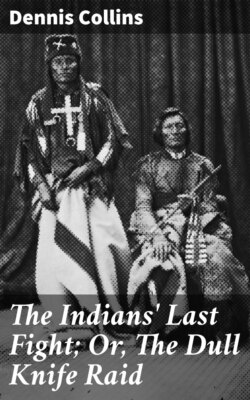Читать книгу The Indians' Last Fight; Or, The Dull Knife Raid - Dennis Collins - Страница 3
На сайте Литреса книга снята с продажи.
PREFACE
ОглавлениеTable of Contents
The work of writing a book is one that requires a vast amount of knowledge, natural ability and educational advantages, to produce something that is reliable, as regards information imparted, unimpeachable authority, and, at the same time, a power of expression that will present the matter to the reader in a manner that will convey the proper meaning of the author. I would not have undertaken the present work, were it not that I was encouraged by the friends of former days who felt confident in my ability to portray the scenes to be depicted in a fitting manner. I should probably be able to perform the task before me with greater success if I had some of the advantages of what is called Higher Education, but, I set out on my journey through this new domain, encouraged particularly, by a statement made by a certain ex-President, that he did not believe in all the “Ph’s”, and “Ch’s”, that are in common use in our language; that he believed in a plain, intelligent expression of ideas that conveys the full meaning of the speaker or writer, without any unnecessary verbiage.
My own personal qualifications for undertaking the task before me, might be considered too inadequate to many. True, I have not had the advantage of a University Education, but with a solid foundation of learning laid in the little school of boyhood in Canada, supplemented by a wide course of reading through all the years I have spent in the West, I feel that the difficulties before me are not too great to be overcome, especially as I have the example of so many men before me who have become self-educated by an earnest application of time and energy to the opportunities presented. If I have developed any facility of expression, I must attribute it to the wealth of good books I have had the good fortune to have at my disposal at various times.
Another motive that has impelled me to undertake the task of presenting the “West” to the general reader, is that there has been so much written about it that is not veracious, and that many have a false notion of what the term really means. I shall endeavor to set before the public a true account of many of the recent happenings in the vast country that lies west of the Mississippi, that they may have a better idea of its history and its people. I have read in numerous Magazines and Journals, accounts of the habits and customs of the Western People in general, and of the cow-puncher in particular, with a full description of the Indian at peace and at war, that, from the reality, it would be impossible to recognize any of them. I am quite satisfied that the authors of the so-called narrations did not have an opportunity of studying the subject at close quarters, and, consequently, were not in a position to do the topic justice. As a consequence of this unreliable mode of narration, people who do not know, imagine that the cow-puncher was half-man and half-horse, or, if not so bad as that, pictured him as a ranting, roaring, rollicking, bloodthirsty, oath-emitting, unconstrained son of perdition, whose chief occupation was murder and rapine, and whose avocation was herding cattle. As for the Indian, he was supposed to have no other qualification for attention than murder and pillage, totally depraved, and beyond the scope of all civilizing influences. Such ideas are based on imaginary authority, and are as far from the truth as it is possible for any narrative to be. I shall endeavor to set before the reading public a proper appreciation of both the Indian and the cow-puncher. Both had faults, but, in view of their surroundings and circumstances of life, they both will bear comparison with those who have had all the advantages of the higher education, and the influence of civilization. One thing that will always stand in their favor is that they were “men,” and played the game of life, in “man” fashion. Smallness, or rather, pettiness of character was entirely lacking in their general scheme of life; that remained in the big cities of the East.
Having spent more than thirty years among the cow-men and the Indians of the different tribes, from the Dakota line to the Panhandle of Texas, I feel that I am not presuming when I say that in that time I have acquired considerable knowledge of both classes of men, their habits, and ideals, and I trust that the present narrative may be interesting to all my old comrades of the “Plains” as well as instructive to the friends of my boyhood days in the “Land of the Maple Leaf.” I have the further hope, that if any of the readers of this little work contemplate coming west to grow up with the country, they may find the difficulties of the way overcome, and the rough places made smooth. They will find a generous welcome awaiting them from the whole-souled men of the Great West, and will discover that their lot has fallen on pleasant places.
THE AUTHOR.
